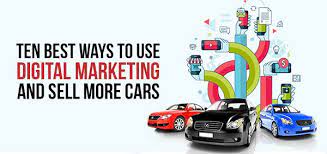The Power of Automotive Digital Marketing
In today’s digital age, the automotive industry is rapidly evolving, and so is the way it markets its products and services. Automotive digital marketing has become a crucial strategy for car manufacturers, dealerships, and aftermarket businesses to reach their target audience effectively.
Benefits of Automotive Digital Marketing
Increased Reach: With digital marketing channels such as social media, search engines, and email campaigns, automotive businesses can reach a wider audience beyond traditional advertising methods.
Precise Targeting: Digital marketing allows for precise targeting based on demographics, interests, online behaviour, and more. This ensures that the right message reaches the right people at the right time.
Data-Driven Insights: Through analytics tools, automotive businesses can track and measure the performance of their digital marketing campaigns in real-time. This data provides valuable insights to refine strategies for better results.
Digital Marketing Strategies for the Automotive Industry
Search Engine Optimization (SEO): Optimising website content and utilising relevant keywords can improve search engine rankings and drive organic traffic to automotive websites.
Social Media Marketing: Engaging with consumers on platforms like Facebook, Instagram, and Twitter helps build brand awareness, foster customer relationships, and drive website traffic.
Paid Advertising: Utilising pay-per-click (PPC) advertising on search engines or social media platforms can increase visibility and lead generation for automotive businesses.
The Future of Automotive Digital Marketing
The future of automotive digital marketing lies in embracing emerging technologies such as artificial intelligence (AI), virtual reality (VR), and augmented reality (AR) to create immersive experiences for consumers. Personalised messaging and interactive content will continue to play a significant role in engaging with tech-savvy car buyers.
In conclusion, automotive digital marketing is essential for staying competitive in a rapidly changing industry landscape. By leveraging digital channels effectively, automotive businesses can connect with their target audience, drive sales, and build lasting relationships in the digital era.
Top 7 Automotive Digital Marketing Tips to Drive Success
- Utilize social media platforms to engage with potential customers
- Create high-quality content such as videos and blogs to showcase your expertise
- Optimize your website for mobile devices to reach a wider audience
- Invest in targeted online advertising campaigns for better ROI
- Utilise search engine optimization (SEO) techniques to improve visibility in search results
- Encourage customer reviews and testimonials to build trust with potential buyers
- Stay updated on the latest automotive trends and digital marketing strategies
Utilize social media platforms to engage with potential customers
In the realm of automotive digital marketing, a valuable tip is to harness the power of social media platforms to actively engage with potential customers. By creating compelling content, responding to queries, and initiating meaningful conversations on platforms like Facebook, Instagram, and Twitter, automotive businesses can establish a strong online presence and build relationships with their target audience. This approach not only enhances brand visibility but also fosters trust and loyalty among customers, ultimately driving conversions and boosting overall sales performance in the competitive automotive market.
Create high-quality content such as videos and blogs to showcase your expertise
Creating high-quality content, such as engaging videos and informative blogs, is a powerful tip in automotive digital marketing. By showcasing expertise through compelling content, car manufacturers, dealerships, and aftermarket businesses can establish credibility with their target audience. Videos highlighting product features or behind-the-scenes insights and blogs offering expert advice or industry updates not only demonstrate knowledge but also engage and educate potential customers. This approach not only enhances brand reputation but also helps drive traffic to websites and increase conversions in the competitive automotive market.
Optimize your website for mobile devices to reach a wider audience
To maximise your reach in automotive digital marketing, it is crucial to optimise your website for mobile devices. With the increasing use of smartphones and tablets, ensuring that your website is mobile-friendly allows you to connect with a broader audience on the go. By providing a seamless and responsive browsing experience on mobile devices, you can attract and engage potential customers who prefer to access information and services conveniently from their handheld devices. Mobile optimisation not only enhances user experience but also boosts your website’s visibility in search engine results, ultimately driving more traffic and potential leads to your automotive business.
Invest in targeted online advertising campaigns for better ROI
Investing in targeted online advertising campaigns is a strategic tip in automotive digital marketing that can significantly enhance return on investment (ROI). By tailoring advertisements to specific demographics, interests, and online behaviours of potential customers, automotive businesses can maximise the effectiveness of their marketing efforts. This approach not only increases the chances of reaching the right audience but also improves conversion rates and ultimately drives higher ROI. By focusing resources on targeted online advertising, automotive companies can see tangible results and achieve greater success in the competitive digital landscape.
Utilise search engine optimization (SEO) techniques to improve visibility in search results
By utilising search engine optimisation (SEO) techniques, automotive businesses can enhance their online visibility and increase their presence in search engine results. Implementing SEO strategies such as keyword optimisation, content quality improvement, and website structure enhancement can help attract more organic traffic to their websites. By appearing higher in search results, automotive companies can reach a larger audience of potential customers actively searching for relevant products or services, ultimately driving more qualified leads and boosting their online performance.
Encourage customer reviews and testimonials to build trust with potential buyers
Encouraging customer reviews and testimonials is a powerful strategy in automotive digital marketing to build trust with potential buyers. Hearing positive feedback from satisfied customers can instil confidence in prospective buyers and influence their purchasing decisions. Authentic testimonials serve as social proof of the quality and reliability of your products or services, helping to establish credibility and strengthen the relationship between your brand and consumers. By showcasing real-life experiences shared by happy customers, you create a sense of transparency and trustworthiness that resonates with potential buyers in the competitive automotive industry.
Stay updated on the latest automotive trends and digital marketing strategies
To succeed in automotive digital marketing, it is crucial to stay updated on the latest automotive trends and digital marketing strategies. By keeping abreast of industry developments, such as advancements in electric vehicles, autonomous driving technology, and changing consumer preferences, businesses can tailor their marketing efforts to resonate with their target audience effectively. Similarly, staying informed about evolving digital marketing strategies, such as social media algorithms and search engine updates, ensures that automotive brands remain competitive and relevant in a dynamic online landscape. Continuous learning and adaptation to new trends are key to driving success in automotive digital marketing campaigns.


